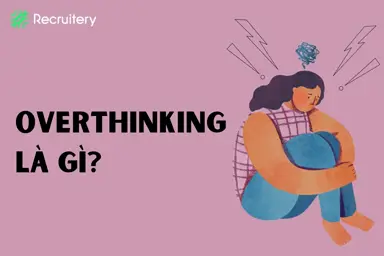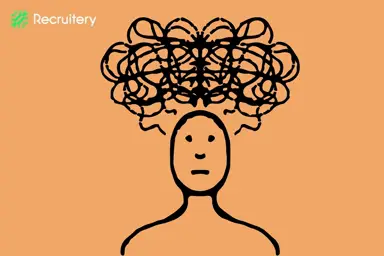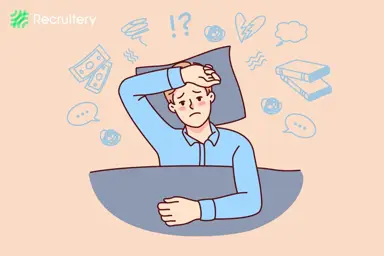What is overthinking? What are the effects of overthinking?
Overthinking has become a common syndrome among Generation Z. So, what is overthinking? Let's delve into this syndrome with Aniday and learn more about it.
What is Overthinking?

Overthinking refers to the act of thinking excessively or a state in which the brain processes more information than it can handle. It involves self-judgment, frustration, and being haunted by your own thoughts. Your mind continuously dwells on persistent problems that hinder your progress in life.
In addition to understanding what overthinking is, there are two primary types: dwelling on the past and worrying about the future. However, psychotherapist Jessica Foley points out that "Not all overthinking is bad."
The feeling of fear and excessive contemplation within a short span can sometimes motivate individuals to take action towards problem-solving or goal achievement. However, when it obstructs your goals, detailed plans, or interferes with your daily life, mental and emotional well-being, it can become a toxic and negative cognitive pattern amounting to a mental disorder.
What are the Symptoms of Overthinking?

After discussing the concept of what overthinking is, let's explore some common symptoms:
- Inability to focus on anything other than the issue at hand
- Persistent restlessness, making it difficult to relax
- Constant feelings of worry or insecurity
- Experiencing extreme fatigue
- Overwhelming invasion of negative thoughts
- Recurrent thoughts of past experiences or situations
- Pessimistic anticipation of worst-case scenarios
- Doubting your own decisions
- Exaggerating problems, making them appear worse than they are
What are the Harmful Effects of Overthinking?

Beyond recognizing the common symptoms of overthinking, it's important to understand the detrimental impact this syndrome can have on mental health, psychological well-being, and work performance.
Physical and Mental Health
Individuals who frequently succumb to overthinking and suppress their problems may be susceptible to depression and heightened anxiety. This is largely due to the prolonged strain placed on the nervous system.
Education and Employment
Overthinking keeps the brain and nervous system engaged in processing information incessantly, leading to feelings of overwhelm, anxiety, and exhaustion. This can result in physical symptoms such as headaches, loss of appetite, and sleep disturbances.
Consequently, it becomes challenging to concentrate on work or studies. Overthinking also hampers problem-solving and creative thinking, posing risks to one's professional and personal life.
Solutions to Overcome Overthinking Syndrome
Having explored "what is overthinking" and its negative effects, it's crucial to discuss methods to overcome it. Overthinking not only harms individuals but also affects their relationships with friends and loved ones. Here are three effective ways to combat overthinking:
Meditation
Practicing meditation helps calm the mind, alleviates heavy thoughts, and leads to mental clarity. Begin with deep breathing exercises and learn to redirect your thoughts when negativity arises. Studies have demonstrated that as little as 10 minutes of daily meditation can reduce intrusive thoughts.
Self-Appreciation
Recognizing and appreciating your achievements, whether big or small. This fosters a positive outlook and can serve as motivation toward your larger goals. Acknowledging your successes prevents you from being overwhelmed by negativity.
Journaling
Keeping a diary is an effective method for managing overthinking. Writing down your thoughts, even in an unstructured manner, helps clear mental clutter and curtails the overthinking process. It transforms your thoughts into actionable ideas and plans.
Physical Activity
Engaging in physical activities such as jogging, playing sports, or exercising can reduce stress, anxiety, and enhance overall well-being. Exercise promotes a more optimistic outlook on life.
Expressing Gratitude
Learn to appreciate your current accomplishments and be content with your present circumstances. Acknowledging your efforts, both small and large, helps maintain a positive mindset.
Sharing and Listening
Opening up to close friends and confidants can be an effective way to alleviate pressure and stress. Sometimes, all you need is a sympathetic ear to express your feelings, reducing negative thoughts and finding inner peace.
How to Identify Overthinking
Overthinking is a psychological pattern characterized by excessive rumination on problems, events, or people. It can lead to negative mental health outcomes, including anxiety, stress, and depression.
To determine if you are overthinking, consider taking the DASS-21 test. This tool assesses emotional states, including depression, anxiety, and stress, through 21 questions. Analyzing your responses can help you identify and address overthinking more effectively.
Conclusion
Overthinking is a psychological challenge that can be overcome. Applying the methods discussed or seeking guidance from experts, especially if the issue significantly affects your quality of life, is crucial. Remember that reality may not be as dire as your thoughts suggest, and you can reshape your reality by changing your mindset.
What is overthinking? Aniday thinks all the information provided can help you and gain a deeper understanding of overthinking and shedding light on its symptoms, adverse effects, and strategies to combat this psychological syndrome.
Reference source:
- “Not all overthinking is bad.” - Jessica Foley
- What Is Overthinking, and How Do I Stop Overthinking Everything? - GoodRx
- THAT 21 test
- Depression Anxiety and Stress Scale 21 (DASS-21) – Healthfocus Clinical Psychology Services (healthfocuspsychology.com.au
Aniday's HR Services
Headhunting Service
Find and recruit quality candidates in just 1 week! Supported by 40,000 experienced headhunters in IT, Finance, Marketing… capable of recruiting in any region.
Headhunting Service ➔Employer of Record (EOR) Service
On behalf of your business, we recruit employees and handle payroll without the need to establish a company in markets such as Vietnam, Singapore, Malaysia, India, Indonesia…
Employer of Record (EOR) Service ➔